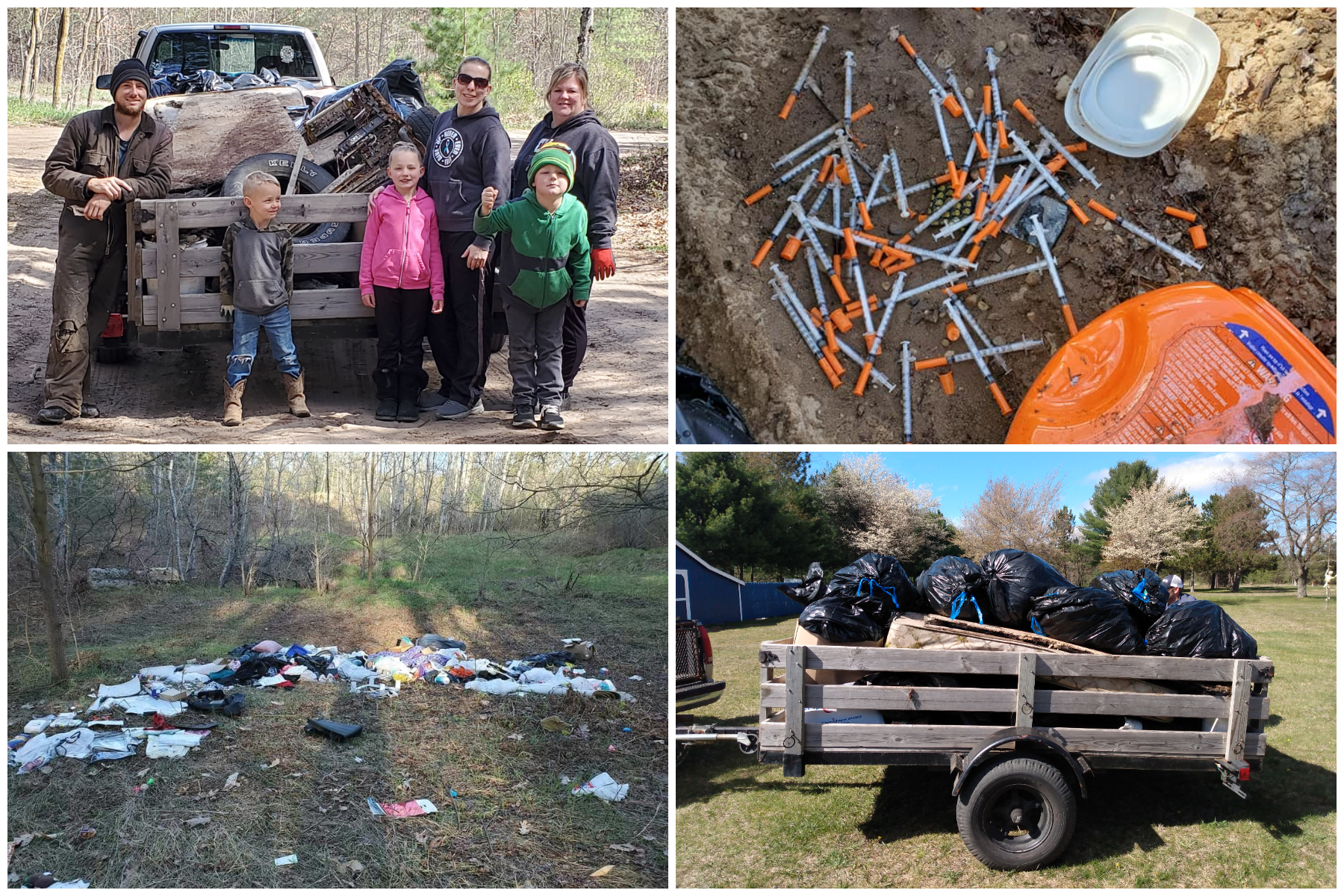
Illegal Dumping In Northern Michigan's Forests Has Become An Epidemic
By Craig Manning | May 9, 2021
Alcohol bottles, food containers, construction debris, old tires, used syringes: just a few of the types of trash that Shawn Huffman has found near local trails, two-tracks, and seasonal roads. And he’s not the only one finding garbage in the northern Michigan woods: According to Adopt-a-Forest – a Michigan Department of Natural Resources program based in Traverse City – there are 678 known illegal trash dumpsites across the state, including dozens in northern Michigan. Despite efforts at awareness, cleanup, and prevention, though, local environmental advocates and law enforcement officials say eradicating illegal dumping locally might just be impossible – at least without a fresh approach.
“We've all gotten tired of looking at trash anytime we go out with our ATVs, or to walk or drive our local roads,” Huffman (pictured) says of himself and his neighbors. “This has been an ongoing problem for years.”
Huffman normally just picks up trash when he sees it. This spring, though, he felt inclined to organize a larger cleanup effort with his neighbors, “due to the large quantity of stuff dumped this year.”
According to Conor Haenni, a Huron Pines AmeriCorps member who works at the Traverse City DNR as part of the Adopt-a-Forest program, illegal dumping typically does see an uptick around this time of year, coinciding with spring cleaning. In northern Michigan, though, dumping is just a constant concern: Adopt-a-Forest says Grand Traverse County has 35 known dumpsites – the third highest of any Michigan county. The problem is also rampant in Wexford (21), Manistee (17), Benzie (16), Antrim (15), and most other local counties. Of the 22 Michigan counties without any known dumpsites, 21 are south of Roscommon; the other is in the Upper Peninsula.
“The more public land there is, the more opportunity there is to dump,” Haenni tells The Ticker. “In the Metro Detroit area, Grand Rapids, most of southern Michigan, we have low dumping numbers for those counties. We also have fewer volunteers and fewer people reporting [in those areas], so I'm sure there are dumpsites and we just don't know about them. But there's also just way less public land down there. When you get up toward Traverse City, Gaylord, Grayling, there's so much more public land, so there's a much higher concentration of dumpsites.”
Haenni says Michigan has more than seven million acres of public land, most of it clustered in the Upper Peninsula or in the northern half of the Mitten. While all that land means a huge array of outdoor resources for people to explore and enjoy – and for wildlife to thrive – it also makes it difficult to combat dumping.
“[Law enforcement] would be going in circles trying to strategically place a camera at the perfect angle, to get a license plate or any type of information,” Haenni says when asked about the potential for securing or surveilling known dumpsites. “And there's so many places [dumping] could happen, so where do you start?”
Grand Traverse County Sheriff Tom Bensley concurs.
“If somebody dumps a bed spring or a washing machine out of the woods, it’s hard to identify who dumped them,” Bensley says. “People don't have to put their names on those kinds of things. So it’s very hard to track people down, unless there's a witness, which typically never happens.”
Andy Gale, president and general manager of Bay Area Recycling for Charities (BARC), thinks illegal dumping is a symptom of two factors – neither of which is a willful disregard for the environment.
“I think people that throw things in the woods don't want to throw things in the woods,” Gale says. “They probably don't feel good about what they're doing. But they do it anyways, because they're missing one of two things: They’re either missing money to pay for [waste disposal], or they're missing time to plan for it. People might not have the money to pay BARC, or to pay American Waste, because there is definitely a cost to recycling. Or they might be in a situation where it’s Saturday night, and they have to be out of their apartment by Sunday morning, and everything’s closed. But they can find a friend who will show up at their apartment with a trailer, and so they go find a two-track out in the woods.”
BARC can recycle everything from mattresses to TVs to refrigerators, but recycling charges range from $5 to $40 for most of those items, with extra fees for pickup services.
Haenni says the “perils of illegal dumping” include groundwater contamination (from batteries, refrigerator freon, chemicals from old TVs, and more), dangerous biowaste hazards (needles, fecal matter), harm to animals and wildlife, depreciation of property value, and negative effects on tourism.
So what’s the solution? Gale encourages people to pursue other options for their unwanted junk – whether that’s seeking help from local churches, giving things away on Craigslist, asking BARC for a discounted rate, using the Grand Traverse County RecycleSmart “Take It Back Recycling Directory,” or even “putting stuff down at the end of the driveway and putting a ‘free’ sign on it.”
Haenni also recommends watching for community recycling events – occasional days when landfills, transfer stations, or local governments will offer free or discounted rates for recycling electronics, furniture, or other hard-to-dispose-of items.
Huffman and Bensley, meanwhile, like the idea of targeting well-known dumpsites specifically. Huffman suggests that the DNR put a fee on its recreation passports to fund litter collection sites along local trails, or to make prepaid garbage bags readily available for volunteer cleanup groups. Bensley raises the possibility of putting large dumpsters out near known dumpsites and having them hauled away and emptied on a regular basis – though he questions who would bear the cost.
For now, Haenni says Adopt-a-Forest is playing a game of whack-a-mole with illegal dumping. Volunteers can schedule their own cleanups and use an interactive Michigan DNR map to find dumpsites. But eradicating dumpsites is difficult – because some sites are known as dumping destinations and attract new refuse on a daily basis, and because new dumpsites can spring up at any time.
“Usually, when you’re out there cleaning, if you continue along the two-track or dirt road, it’s a ‘clean one dumpsite, find two’ kind of thing,” Haenni explains. “So it’s just a continuous battle.”
Comment






